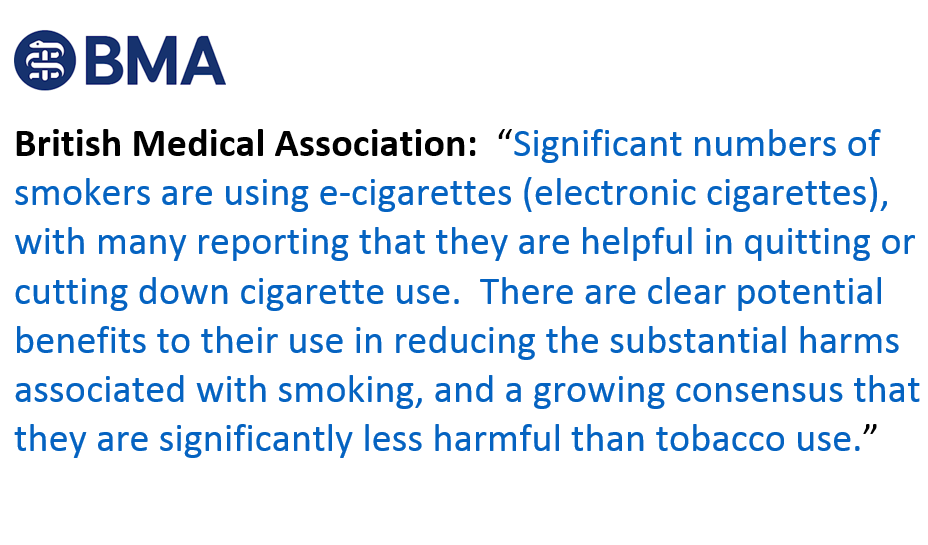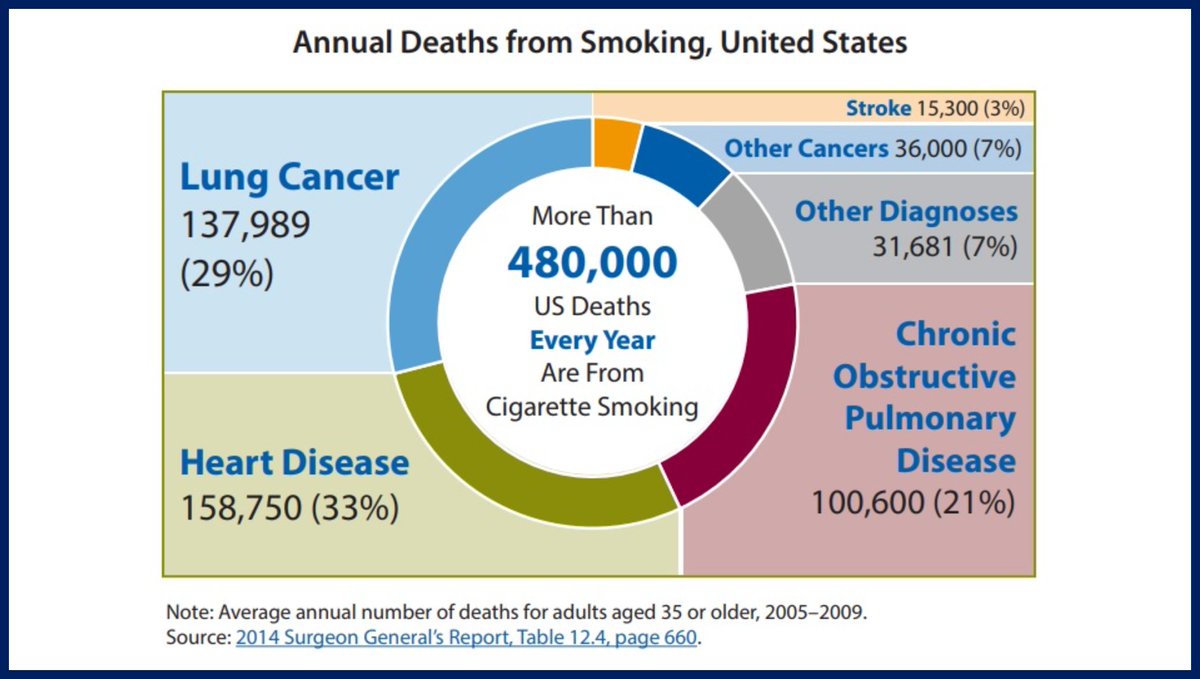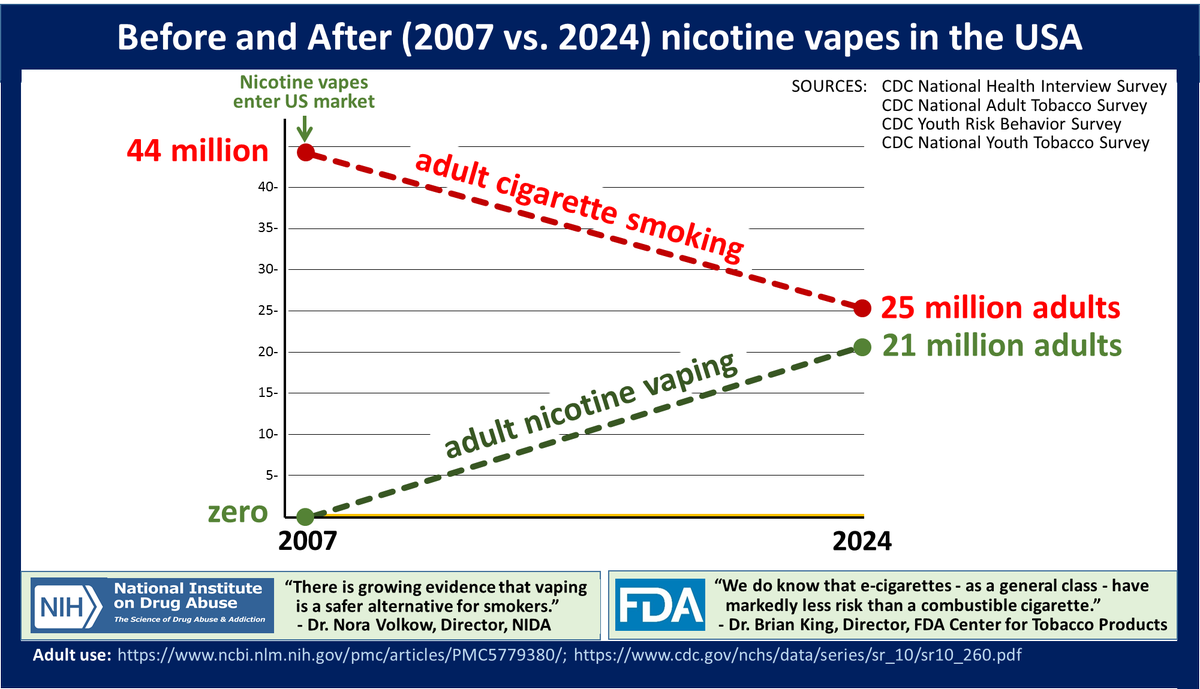1/32
The following respected scientific & public health organizations, with no industry ties, have reviewed the evidence and made public statements on the relative risk of #SaferNicotine vapes vs. toxic tobacco. There's rather a lot of them.
drive.google.com/file/d/1Ty7pgR…
THREAD
👇👇👇
The following respected scientific & public health organizations, with no industry ties, have reviewed the evidence and made public statements on the relative risk of #SaferNicotine vapes vs. toxic tobacco. There's rather a lot of them.
drive.google.com/file/d/1Ty7pgR…
THREAD
👇👇👇
3/32
WHO IARC thinks everything causes cancer. But they say nicotine vapes are safer than deadly cigarettes.
WHO IARC thinks everything causes cancer. But they say nicotine vapes are safer than deadly cigarettes.

4/32
Cochrane is the global gold standard for rigorous evidence reviews in all fields of public health (not just tobacco control). Their review of the evidence found that nicotine vapes really do help smokers quit.
Cochrane is the global gold standard for rigorous evidence reviews in all fields of public health (not just tobacco control). Their review of the evidence found that nicotine vapes really do help smokers quit.

5/32
Public Health England speaks for the entire health service of the UK government (which @exposetobacco says is among those least influenced by big tobacco). Quite extraordinary that @FCTCofficial continues to contradict this finding.
Public Health England speaks for the entire health service of the UK government (which @exposetobacco says is among those least influenced by big tobacco). Quite extraordinary that @FCTCofficial continues to contradict this finding.

6/32
The Royal College of Physicians was the first major public health organization on Earth to officially sound the alarm about cigarettes, back in the 1960s. They looked at all the evidence, and continue to review the evidence, and have not changed their verdict.
The Royal College of Physicians was the first major public health organization on Earth to officially sound the alarm about cigarettes, back in the 1960s. They looked at all the evidence, and continue to review the evidence, and have not changed their verdict.
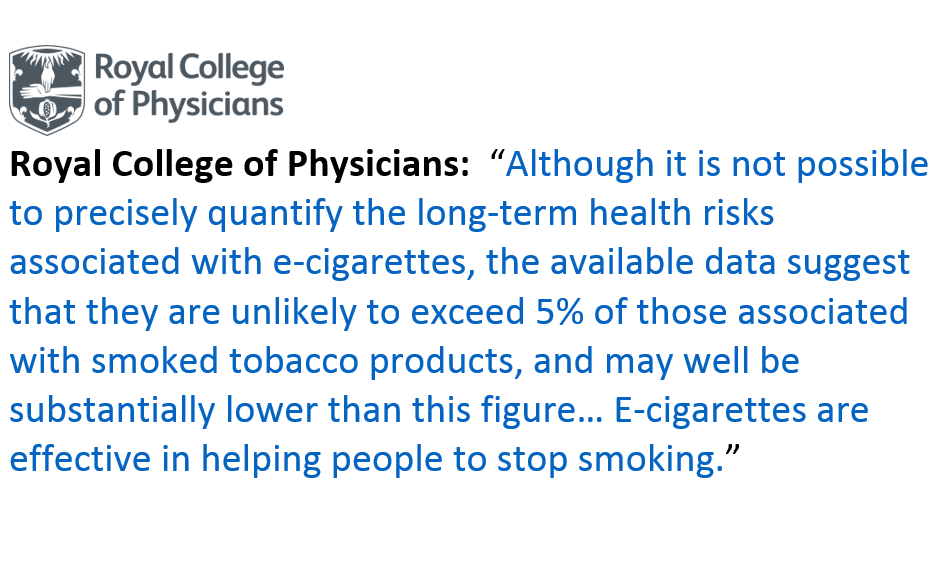
7/32
NICE is the UK health service's research-based agency that tests evidence for safety and effectiveness of health products and services.
NICE is the UK health service's research-based agency that tests evidence for safety and effectiveness of health products and services.

9/32
Cancer Research UK agrees: Far safer and effective for smoking cessation. No harms from 2nd hand vapor.
Cancer Research UK agrees: Far safer and effective for smoking cessation. No harms from 2nd hand vapor.

10/32
The British Lung Foundation agrees: Safer. And switching to these safer alternatives reduces symptoms of asthma and COPD.
The British Lung Foundation agrees: Safer. And switching to these safer alternatives reduces symptoms of asthma and COPD.
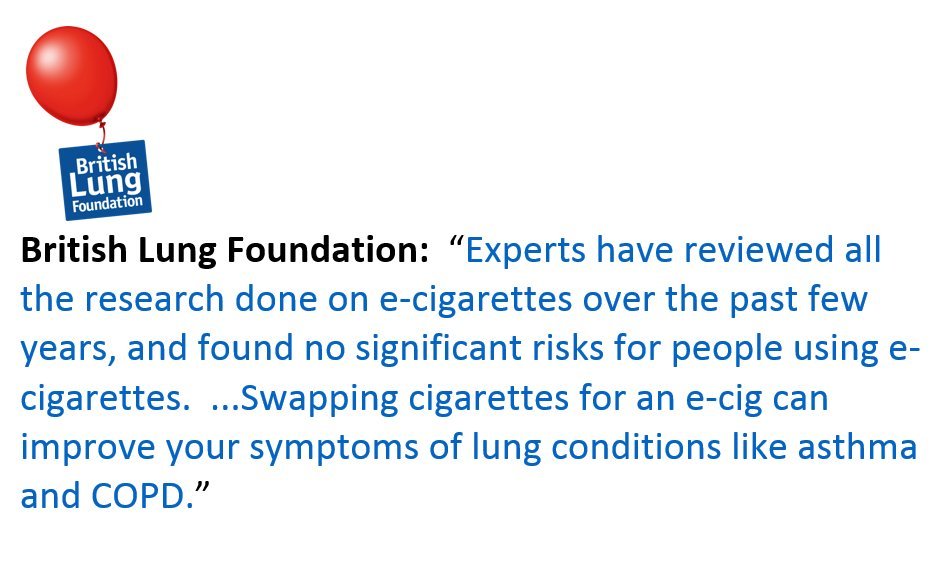
11/32
The Royal College of General Practitioners represents all GPs in the UK. Toxins in nicotine vapor are "well below the threshhold for concern."
The Royal College of General Practitioners represents all GPs in the UK. Toxins in nicotine vapor are "well below the threshhold for concern."

12/32
The Royal Society for Public Health agrees with Public Health England and all the others above. At least 95% safer, and effective for smoking cessation.
The Royal Society for Public Health agrees with Public Health England and all the others above. At least 95% safer, and effective for smoking cessation.

13/32
The UK Stroke Association agrees. They say "in the short term" because nicotine vapes have only been used safely for 15 years. Hedging their bets.
The UK Stroke Association agrees. They say "in the short term" because nicotine vapes have only been used safely for 15 years. Hedging their bets.

14/32
Action on Smoking and Health UK is a fierce opponent of big tobacco. They agree nicotine vapes are >95% safer than smoking, and lower cancer risk by 99.5%. They also note that misinformation is causing the public to be increasing misinformed about relative risks.
Action on Smoking and Health UK is a fierce opponent of big tobacco. They agree nicotine vapes are >95% safer than smoking, and lower cancer risk by 99.5%. They also note that misinformation is causing the public to be increasing misinformed about relative risks.

15/32
The UK's National Centre for Smoking Cessation and Training agrees: Far safer than smoking. They point out the FACT that nicotine does not cause smoking-related cancer, heart or lung disease (NOTE: 80% of US doctors believe, incorrectly, the opposite).
The UK's National Centre for Smoking Cessation and Training agrees: Far safer than smoking. They point out the FACT that nicotine does not cause smoking-related cancer, heart or lung disease (NOTE: 80% of US doctors believe, incorrectly, the opposite).
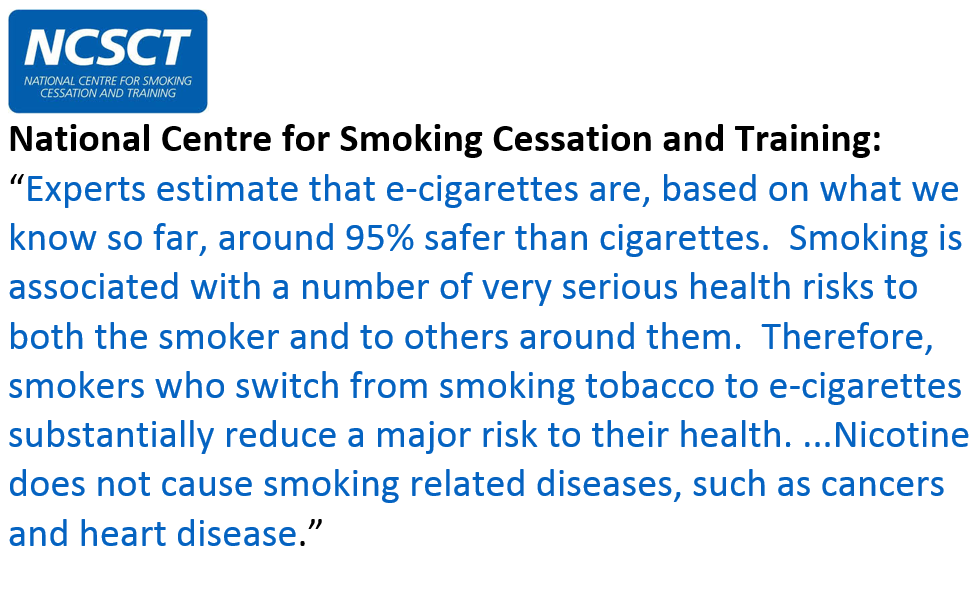
16/32
Everyone who's anyone in Scotland agrees. Nicotine vaping is less harmful than smoking. The signatories are what puts this list to well over 35+ respected scientific and public health organizations.
Everyone who's anyone in Scotland agrees. Nicotine vaping is less harmful than smoking. The signatories are what puts this list to well over 35+ respected scientific and public health organizations.

17/32
Moving on to New Zealand: The Ministry of Health embraces nicotine vapes as an effective way to help Kiwi's quit smoking. Vaping is not a gateway to smoking (#GatewayMyth), and may accelerate the decline in teen smoking.
Moving on to New Zealand: The Ministry of Health embraces nicotine vapes as an effective way to help Kiwi's quit smoking. Vaping is not a gateway to smoking (#GatewayMyth), and may accelerate the decline in teen smoking.

18/32
New Zealand's Cancer Society agrees. Which means they, along with the WHO's International Agency for Research on Cancer, and Cancer Research UK, all disagree with the American Cancer Society's current recommendations (more on those below).
@AmericanCancer
New Zealand's Cancer Society agrees. Which means they, along with the WHO's International Agency for Research on Cancer, and Cancer Research UK, all disagree with the American Cancer Society's current recommendations (more on those below).
@AmericanCancer

19/32
Physicians in OZ & NZ who work with People Living with #Schizophrenia, #BipolarDisorder and other #Neurodiversity issues disagree with the Govt of Australia's rigid position against #SaferNicotine.
Physicians in OZ & NZ who work with People Living with #Schizophrenia, #BipolarDisorder and other #Neurodiversity issues disagree with the Govt of Australia's rigid position against #SaferNicotine.

20/32
So... Not surprisingly, nurses who work with People who use drugs and alcohohl in Australasia agree. They see the horrendous health toll of smoking every day. Nicotine vapes are "a legitimate form of #HarmReduction."
So... Not surprisingly, nurses who work with People who use drugs and alcohohl in Australasia agree. They see the horrendous health toll of smoking every day. Nicotine vapes are "a legitimate form of #HarmReduction."
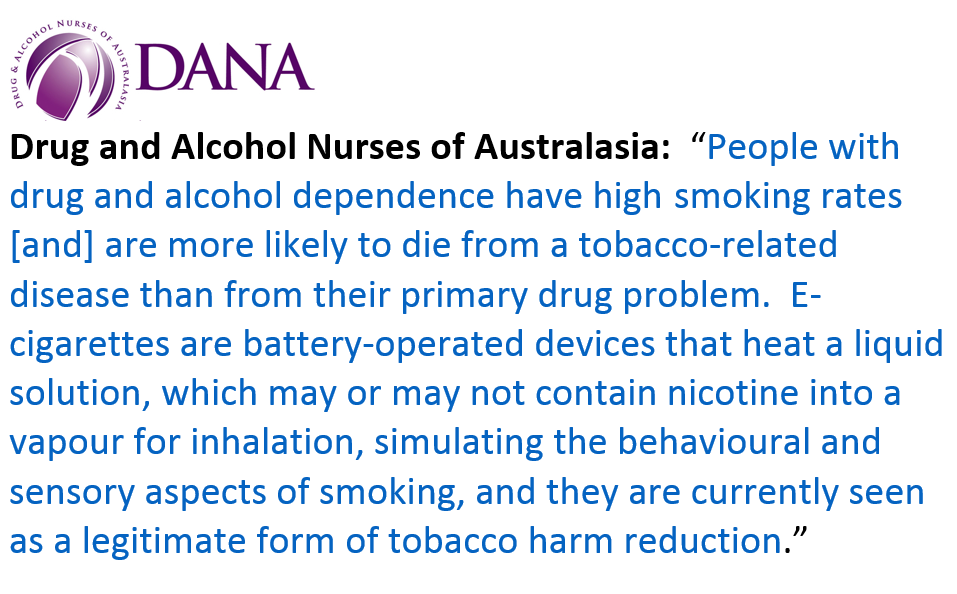
21/32
The Govt of Australia takes an extreme dogmatic negative approach to #SaferNicotine (unless it's in patches and gum). But the Royal Australian College of Physicians does, grudgingly, accept that e-cigarettes may save lives.
The Govt of Australia takes an extreme dogmatic negative approach to #SaferNicotine (unless it's in patches and gum). But the Royal Australian College of Physicians does, grudgingly, accept that e-cigarettes may save lives.

22/32
So, we've covered multinational, UK, New Zealand and Australia. What does Germany say? Hard to get a clear reading there, but the German Federal Institute for Risk Assessment has a statement: "Less harmful."
So, we've covered multinational, UK, New Zealand and Australia. What does Germany say? Hard to get a clear reading there, but the German Federal Institute for Risk Assessment has a statement: "Less harmful."

23/32
Now that we're back in the EU, what about the French? The French National Academy of Medicine says "safer than smoking." The High Authority for Health says "effective for smoking cessation." Santé Publique France says loads of French smokers have quit this way.
Now that we're back in the EU, what about the French? The French National Academy of Medicine says "safer than smoking." The High Authority for Health says "effective for smoking cessation." Santé Publique France says loads of French smokers have quit this way.

24/32
The French National Academy of Pharmacy was a bit more forceful on this, criticizing the @WHO's anti-vaping position as "incompréhensible." But this is just a Tweet. I have not found an official public statement (yet). Let me know if you do. They don't mince words.
The French National Academy of Pharmacy was a bit more forceful on this, criticizing the @WHO's anti-vaping position as "incompréhensible." But this is just a Tweet. I have not found an official public statement (yet). Let me know if you do. They don't mince words.

25/32
Next the USA: The US National Academies of Sciences, Engineering and Medicing reviewed ALL data on nicotine vape safety, and issued a report in 2018. "LESS HARMFUL" and "SIGNIFICANTLY LOWER TOXINS" than combustible cigarettes stand out.
Next the USA: The US National Academies of Sciences, Engineering and Medicing reviewed ALL data on nicotine vape safety, and issued a report in 2018. "LESS HARMFUL" and "SIGNIFICANTLY LOWER TOXINS" than combustible cigarettes stand out.

26/32
@US_FDA embraces "a continuum of risk" (which many tobacco control experts oddly reject). FDA wants to restrict nicotine in cigarettes to near zero, while keeping #SaferNicotine alternatives available.
@US_FDA embraces "a continuum of risk" (which many tobacco control experts oddly reject). FDA wants to restrict nicotine in cigarettes to near zero, while keeping #SaferNicotine alternatives available.

27/32
The @CDCgov gave us "EVALI" (2019 lung injuries that were caused by bootleg THC vapes, which @CDCTobaccoFree blamed on nicotine vapes, or "e-cigarettes"). But they do admit nicotine vapes are safer than smoking. A bit grudgingly.
The @CDCgov gave us "EVALI" (2019 lung injuries that were caused by bootleg THC vapes, which @CDCTobaccoFree blamed on nicotine vapes, or "e-cigarettes"). But they do admit nicotine vapes are safer than smoking. A bit grudgingly.

28/32a
The American Cancer Society KNOWS cancer risk from nicotine vaping is far lower than smoking. Here, however, you can see how public health "experts" wobble on WHAT TO TELL THE PUBLIC. Teen vaping increased, so they changed their recommendation to adults....
The American Cancer Society KNOWS cancer risk from nicotine vaping is far lower than smoking. Here, however, you can see how public health "experts" wobble on WHAT TO TELL THE PUBLIC. Teen vaping increased, so they changed their recommendation to adults....

28/32b
Now that teen nicotine vaping has plummeted, perhaps it's time for @AmericanCancer to revise its recommendation... Again... Recommendations from respected professional societies like ACS really do affect adult smokers' and vapers' behavior. And smoking really does kill.
Now that teen nicotine vaping has plummeted, perhaps it's time for @AmericanCancer to revise its recommendation... Again... Recommendations from respected professional societies like ACS really do affect adult smokers' and vapers' behavior. And smoking really does kill.

29/32
American @American_Heart recently put out a Press Release: Biomarkers for heart risk in exclusive vapers are indistinguishable from never-smokers. But the headline on that Press Release was "People who vape AND smoke have the same risk as smokers." This is odd.
American @American_Heart recently put out a Press Release: Biomarkers for heart risk in exclusive vapers are indistinguishable from never-smokers. But the headline on that Press Release was "People who vape AND smoke have the same risk as smokers." This is odd.

30/32
American Association of Public Health Physicians gives us the big picture. #SaferNicotine vapes are just one tool in the armamentarium of options that SHOULD be available because they are safer than smoking, and smokers should have all options to quit.
American Association of Public Health Physicians gives us the big picture. #SaferNicotine vapes are just one tool in the armamentarium of options that SHOULD be available because they are safer than smoking, and smokers should have all options to quit.

31/32
Believe it or not, grudgingly said, with a lot of "coulds" and "ifs." ...Might help people not die.
Believe it or not, grudgingly said, with a lot of "coulds" and "ifs." ...Might help people not die.

32/32
Last, but by far not least, the Government of Canada has this official public statement: Nicotine vaping is "less harmful than smoking." Very clear.
Last, but by far not least, the Government of Canada has this official public statement: Nicotine vaping is "less harmful than smoking." Very clear.

CODA: Please let me know if you are aware of other official statements from respected non-tobacco scientific and public health organizations, and governments around the world.
• • •
Missing some Tweet in this thread? You can try to
force a refresh


